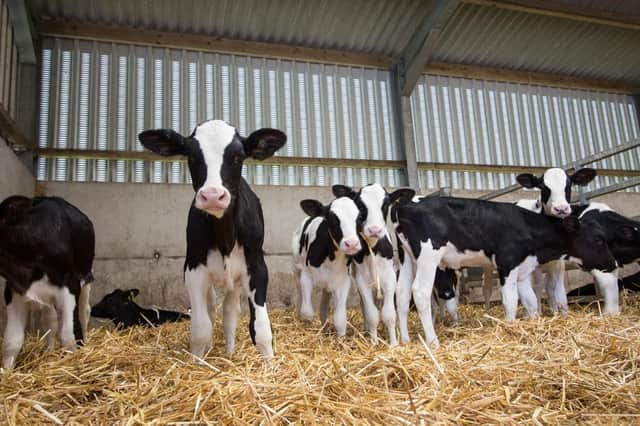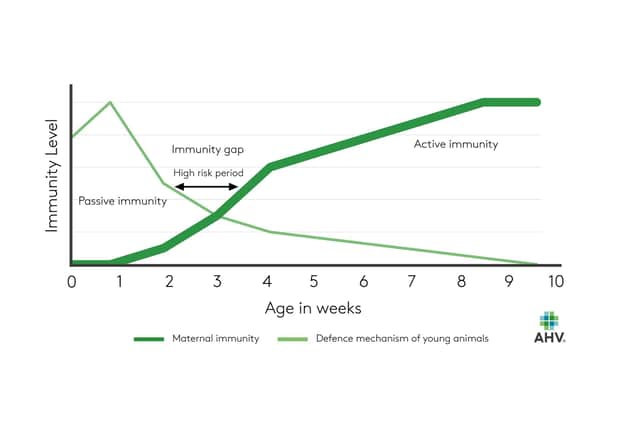Get your calves off to the best start with AHV


The immunity gap
During the first weeks of life, calves depend on colostrum for passive immunity while their active immune system gradually develops. However, by two to three weeks old, the immunity provided by colostrum diminishes before the calf's own immune system fully matures (see Figure 1).
This transition period is known as ‘The Immunity Gap’. The AHV Calf Programme is designed to bridge this critical gap and support calves.


AHV Calf Start forms the first part of the proactive AHV Calf Rearing Programme. It supports the calf's immune system and promotes optimal digestive tract development, aiding nutrient absorption and reducing digestive upsets. Calves receive Calf Start as a powder, dissolved in their milk at a rate of 25 grams per calf, twice daily for the first two weeks of life.
Addressing respiratory challenges
Respiratory challenges in calves can lead to significant economic losses based on poor performance and reduced growth rates. Studies indicate that calves suffering from respiratory issues may experience a 50% reduction in weight gain for 30 days or more*. Moreover, addressing these challenges incurs additional costs and has long-term repercussions on the animal's health and productivity.
Research also shows that respiratory challenges in young calves can reduce first lactation yield by 4% and second lactation yield by 8%. Animals with respiratory challenge relapses experience even greater reductions, with first and second lactation yields dropping by 5% and 10%, respectively*.
AHV Respi continues the proactive approach of the AHV Calf Rearing Programme, working to minimize the impact of respiratory challenges. Respi helps to clear harmful pathogens from lung tissue while the calf's respiratory system is healthy and minimally stressed. By reducing the pathogen load, calves are better prepared to handle future stressors, such as dehorning and weaning. Respi is administered by adding 10 to 15 grams per calf (dependant on bodyweight) to milk during weeks three and four of life.
Managing weaning
Weaning stress can make calves vulnerable to health issues and reduced feed intake can result in the 'post-weaning growth dip.' To mitigate this dip and meet growth targets, extending the rearing period is an option, but it comes with increased costs in terms of time, labour and feed.
Failure to meet dairy heifer growth targets can lead to delayed breeding and calving*. Therefore, it is essential to provide support around weaning to minimize the impact of the post-weaning growth dip and maintain growth rates.
The AHV Booster Powder completes the AHV Calf Rearing Programme by addressing the energy gap during weaning. This product stimulates feed intake and promotes good rumen development, making more energy available to the calf to support growth rates and the immune system. It should be administered one week before weaning and for one week after weaning, as a top dressing on hard feed, at a rate of 50 grams per calf, twice daily.
Take control and proactively manage calf rearing with the AHV Calf Rearing Programme. For more information visit www.ahvint.com or email [email protected]
*Brooks KR, Raper KC, Ward CE, Holland BP, Krehbiel CR, (2011) The Professional Animal Scientist, Volume 27, Issue 3.
*Morrison, S., Scoley, G. and Barley, J., (2013). Veterinary Ireland Journal, 3(5), pp.264-268.452
*Bach A., (2011) J Dairy Sci; 94:1052-1057